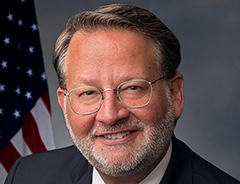
The Senate Homeland Security and Governmental Affairs Committee on Wednesday approved a bill that would enable Customs and Border Protection (CBP) to hire at least 600 new officers annually to meet its staffing needs and directs the agency to report to Congress on what it needs to improve the detection of drugs entering the U.S. through ports of entry. The Securing America’s Ports of Entry Act of 2023 (S. 1253), was sponsored by Sens. Gary Peters (D-Mich.), the committee chairman,…

 By
By 











